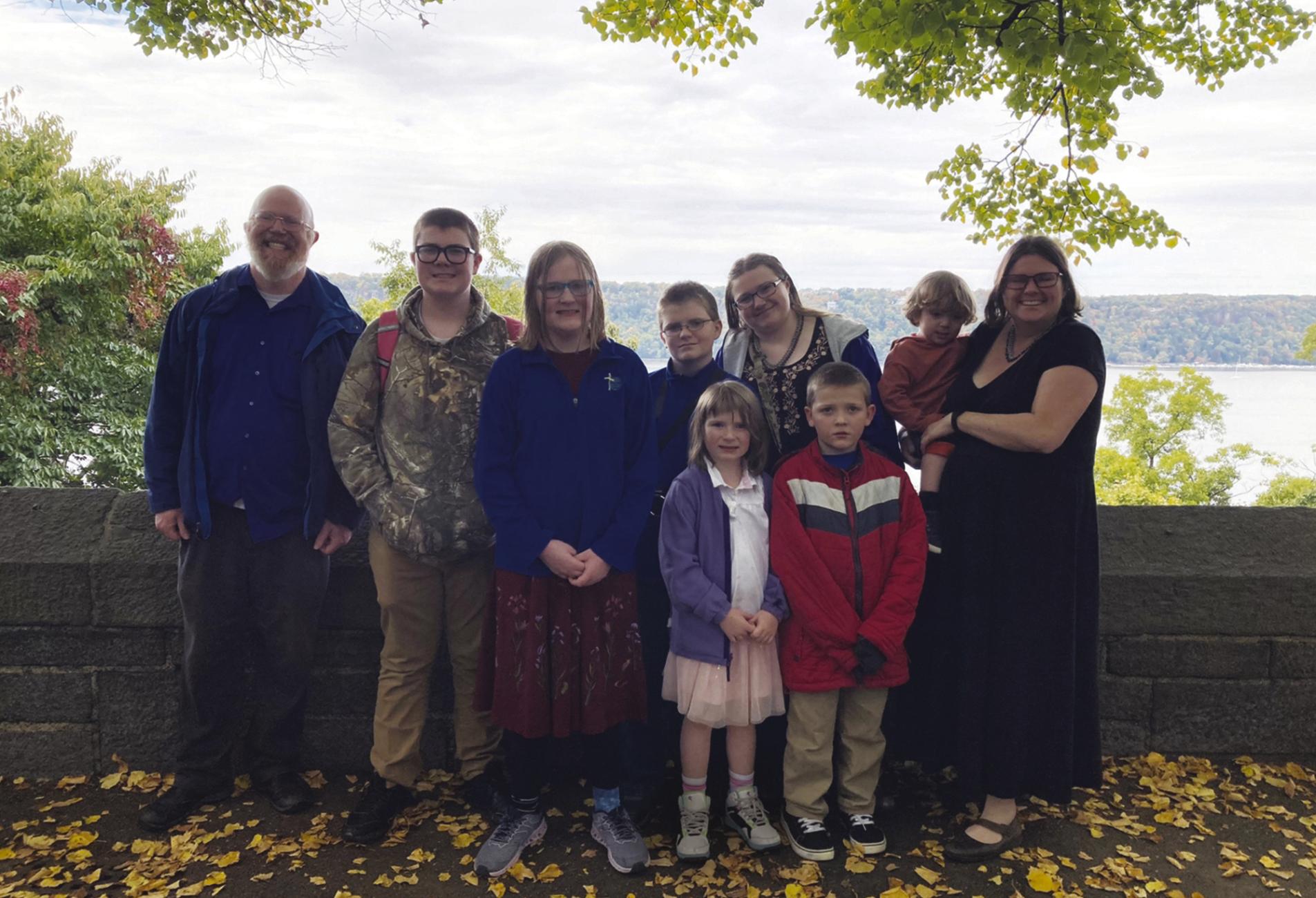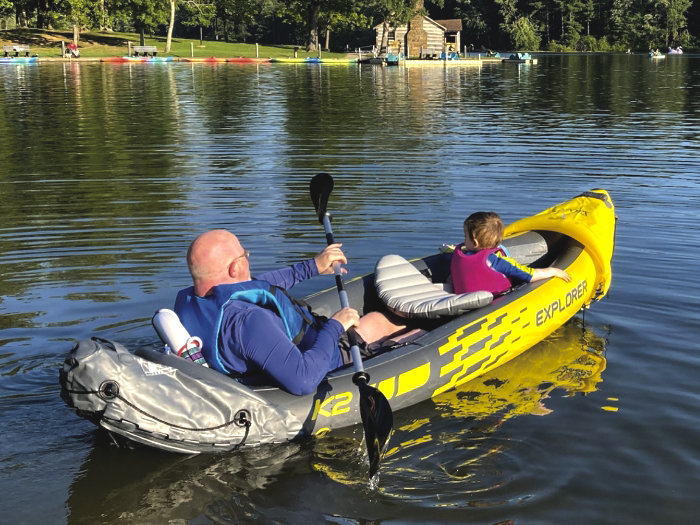
John Mundy, AB’01, and Deirdre Mundy, AB’99, on a college tour with seven of their eight children (left to right): Ben, Ada, Max, Ella, Cecilia, Henry, and Charles. (Photo courtesy Deirdre Mundy, AB’99, and John Mundy, AB’01)
Deirdre Mundy, AB’99, on her family’s mode of human flourishing.
For the Alumni News section of the Summer/23 University of Chicago Magazine, Deirdre (McTague) Mundy, AB’99, sent in a family update. Oldest daughter Anne is now a materials science major at Case Western Reserve University. The seven children still at home—ranging from a three-year-old to a high school senior—are homeschooled. “If you’re currently in the trenches with small kids, hang in there,” Deirdre wrote. “Teens really are delightful!”
Deirdre works full time as a freelance writer; husband John Mundy, AB’01, a former library director, just finished up a four-year accounting degree at Western Governors University in nine months.
Homeschooling seven kids while working and studying full time? The Core had to know more.
This interview has been edited and condensed.
Have you taught in a traditional classroom?
Right after graduation, John and I taught for a year at a Catholic school. We were not great with classroom discipline. Our horrible experience pushed us in the direction of homeschooling.
How so?
Our oldest child has ADHD [attention deficit hyperactivity disorder], and there was no way she could make it through full-day kindergarten. She was cheerful and good-hearted, but she could only do schoolwork if she was standing up and spinning in circles. When she was learning to read, she had to hang upside down by her knees over the back of the couch like a bat. In a home environment, you can let them be that way. Pretty much everyone in our house has ADHD.
How do you stay patient with so many kids?
With the littler kids, I’m pretty laid back, because I was a hot mess as a little kid. If they’re being cheerful and kind, I don’t really care what they’re doing.
On the other hand, toddlers and three-year-olds are super screechy. If you wear lawnmower-guy headphones around the house, you can still have conversations, but it takes that high-pitched screech out. I became a much better mother when I started wearing headphones.
How do you keep the kids from distracting each other?
We live in a small town in Indiana in a big old 1920s house. The beauty of a 1920s house is every room has a door. Every child’s desk is in a different room. We have a school desk in every room except the kitchen.
How big is this house?
It’s a three-bedroom house. Four boys in one room, four girls in the other. We have bunk beds. When my eldest went to college and had one roommate, she said it was heaven.

How do you balance homeschooling with working?
I have a basement office. All my kids, except the three-year-old, can get their own food and drinks. Everyone who is tall enough knows how to use the stove. The deal is, if you cook for your younger siblings, you don’t have to do the dishes.
In terms of school, I check on them and grade their work. Most of them don’t need me standing over them. I have a few who will wander off and read.
And you’ve chosen a great books curriculum?
There’s a homeschool program out of California, the Kolbe Academy, that does great books. The high school curriculum is ninth grade, Greeks; tenth grade, Romans; eleventh grade, medieval and Renaissance; twelfth grade, modern. The curriculum has essay topics and how many pages they should read. Otherwise, I might be too aggressive and burn my kids out.
Kolbe has normal math and science—some homeschool curricula are terrible and will cut your kid off from science and technology careers. And for lab science, we can lean on the local school. Since they take lab science, they’re also allowed to take art and participate in any extracurricular activity except sports.
Since you and your husband were classics majors, are the kids learning Latin and Greek?
They’re learning Latin, but they only do Greek history. Some of them may choose to pick up Greek, but I make them do the Latin first. My senior silver-medaled in the National Latin Exam last year, and I thought she was going to try to get a gold this year. But she decided to take a break and teach herself Anglo-Saxon. She was inspired by Seamus Heaney’s Beowulf, which has the English translation on one side and Anglo-Saxon on the other.
Were you always strong at language learning?
My first year at the U of C, I took Greek. I was coming out of the high-school-Spanish mindset where you can kind of do well enough without actually learning the language. We had James Redfield [LAB’50, AB’54, PhD’61], and he only gave out As, Bs, and Fs. I was getting a B minus, so I failed and had to retake Greek. I’m glad he failed me. He was right—if you’re only getting a B minus, you’re never going to love Greek. I ended up a classics major.
Did your kids ever ask to attend regular school?
No. They don’t like sitting still enough to want to do it for six hours a day. If they focus, they can get through a whole day’s work in two hours.
And they’ve never been bullied. Seeing how confident and happy they are in themselves is huge.
Do they argue with you about grades?
My kids are not motivated by grades at all. If you’re homeschooled, there’s not an honor roll or class rank. You’re first and last in your class all the time.
Did you always want a large family?
When we got married, we figured, we’ll be like everyone else—three kids, maybe four. I had a nurse practitioner who had five. She told me adding a third child is the hardest thing you’ll ever do. After three, it’s “Oh, put an extra plate on the table at dinnertime.” She was correct. With that switch from two to three, suddenly you’re outnumbered. It’s horrific.
But after that, it’s not hard. We’ve never been in a position where another child would be that much of a burden. And they’re entertaining.
Ever thought of writing a memoir?
I feel like my life is boring. But I like my boring life. At the U of C, there was a lot of thinking about, What is the good life? What is human flourishing? Whatever you’re doing, you can be an engaged human being and citizen. I tend to think of myself as the most boring of the people I graduated with, but we have a really good life.
